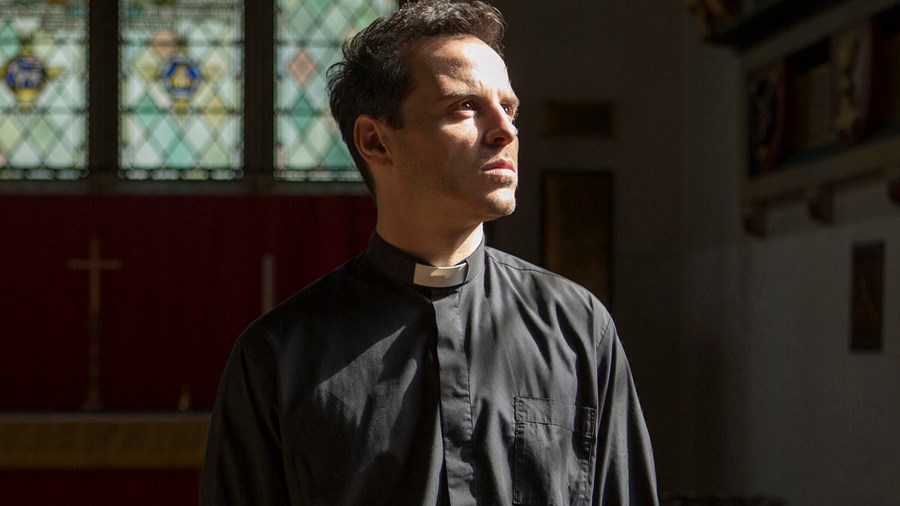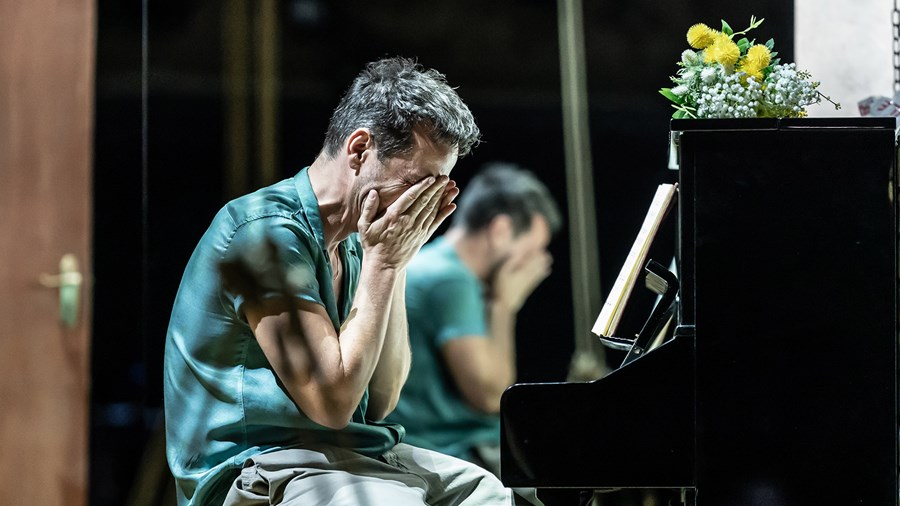As NT Live: Vanya arrives in cinemas, Lauren Morley considers Andrew Scott’s wide-ranging, yet always grounded, performances, from Fleabag’s Hot Priest to All of Us Strangers’ Adam.

There is a moment in NT Live’s Vanya – a one-man version of Anton Chekhov’s 1898 classic Uncle Vanya – where it feels fully possible that Andrew Scott could have cloned himself, and that three versions of him are on stage at once. He’s chameleonic enough that you’d believe it.
Vanya shows how life on a rural estate is completely upended when famous filmmaker Alexander, and his young, glamorous second wife Helena, visit. During this time, estate manager Ivan (Vanya) and country doctor Michael both fall for Helena, and consequently reevaluate their lives. The play stars Andrew Scott portraying all seven characters – including Ivan’s niece Sonya, housekeeper Maureen and local boy Liam – in a powerhouse, multipronged performance. The production enjoyed a sell-out run on the West End last year, alongside a spate of five-star reviews.

In a way, it feels like Scott’s career has been building towards Vanya, so varied are his most celebrated roles. Starting out on the stages of his native Ireland, the West End and Broadway, Scott burst onto our television screens in 2010 as the delightfully unhinged villain Jim Moriarty in BBC’s Sherlock. He gave a playful, terrifying edge to a character who is usually dull and professorial in his ruthlessness. Since then, Scott has been a mainstay of stage and screen, his characters running the gamut from Hamlet to Bond antagonist (Spectre), fantasy hero (His Dark Materials) to droll matinée idol (Present Laughter), the latter of which earned him an Olivier. With every part, Scott conveys a sense of something deeper going on under the surface – unsaid, but clearly legible on his face.
With his beloved ‘Hot Priest’, hired to officiate a family wedding in series two of Fleabag (2019), Scott further demonstrated this facility for internal performances. His clergyman forms a tentative, transgressive romantic relationship with Phoebe Waller-Bridge’s titular tearaway, which simultaneously heals and serves as rock bottom for both of them. Scott brings a quiet confidence to the priest as he flirts with abandoning his vows, trying to do the right thing no matter how much it hurts. It’s terrifically subtle, deeply felt work.

Fleabag (2019)
Scott is uniquely adept at holding space for emotion, as seen with Adam, a man dealing with the impact of a lifetime of loneliness in Andrew Haigh’s All of Us Strangers. He brings a guardedness to the character, who discovers that his late parents are alive and waiting for him in the house he grew up in. His visits home become the key to opening himself up to a romantic relationship with his neighbour (Paul Mescal). Throughout the film, we feel Adam’s gratitude and grief as he discovers the love and support he’s denied himself for so long. Scott is a master of smiles that never quite make it to the eyes, of lit-up eyes downplayed with hesitant smiles. His emotions are fluid, never vacillating, never overwrought.
He takes his considerable skills to new heights in Vanya, where he showcases his immense versatility as an actor. One minute, he’s a beleaguered and gossipy housekeeper, and the next – literally, the very next – he’s a bored and depressed doctor. Another moment, and he’s a young woman filled with hope and energy, and, almost in the same breath, he’s transformed into her uncle, whose decline from cringey jokester to an utterly lost man has happened before our eyes.

All of Us Strangers (2023)
Scott introduces us to each of his characters slowly: establishing their physicality, their voices, their mannerisms. His transitions between them are more marked at the beginning, when he uses props and leaves space for us to register his change in posture, or physically moves from one side of the room to another. He accustoms us to the characters’ different voices – Helena’s is cold, reserved and posh; Alexander’s slow and scatterbrained; Ivan’s jovial and tense, like something could imminently break. Some characters are linked with certain props: Sonya with her tea towel, Michael with his tennis ball, Ivan, again, with his comedy sound-effects box.
But eventually these visual clues fall away, and we know everyone by their sound and posture. Soon, Scott is setting one character down and picking another up as he rises. He is both the person being blocked and the one doing the blocking, the person being comforted and the one tenderly stroking their head. Even the scenes of sexual intimacy between two characters are made believable, handled in a way so focused and naturalistic they don’t seem contrived or actorly. By the play’s end, Scott is throwing his voice as one character and reacting as another, and we know who is who by the arc of his brow, the curve of his smile or the movement of his hand.

NT Live: Vanya (2024)
These smaller movements, which would be felt more than seen from anywhere other than the front rows of a theatre, are what give this cinematic version of Vanya its magic. It’s in the way Sonya can handle a tea towel both nervously and with resolve, the way Michael’s slumped posture goes from listless to lustful and the way Ivan slowly crumbles, sloughing off layer upon layer of coping mechanisms. All of the decisions Scott makes as an actor are clearly rooted in a deep empathy for each of these characters. Quite a feat, then, to maintain this dedication for more characters than can be counted on one hand over the course of two hours.
Vanya is an acting masterclass, a beautiful unfurling of Scott’s multifacetedness. It’s a culmination of what we love about him as an actor: his constant, daring shapeshifting. If he was at the top of his game before, then now he is absolutely stratospheric.
WATCH NT LIVE: VANYA IN CINEMAS




